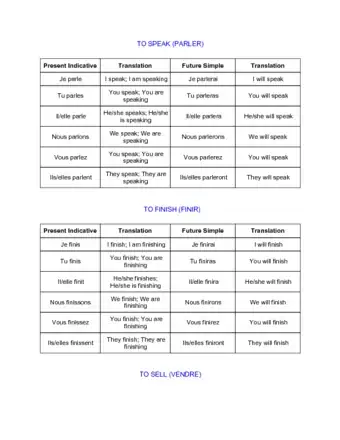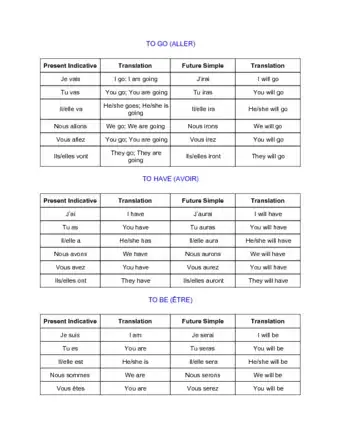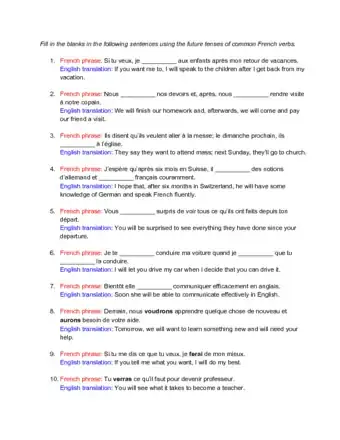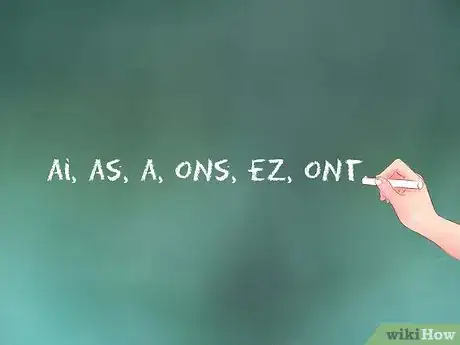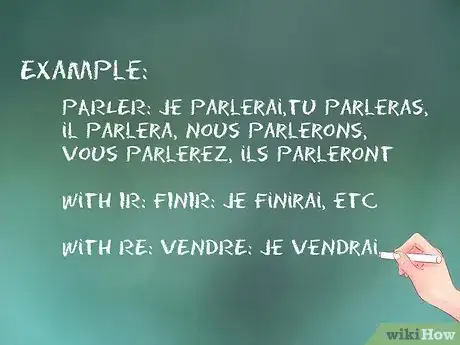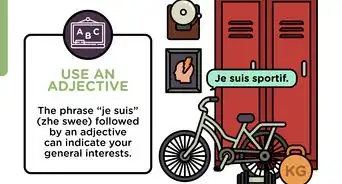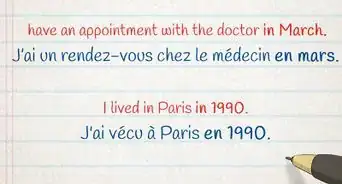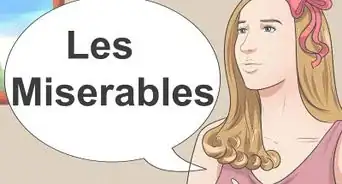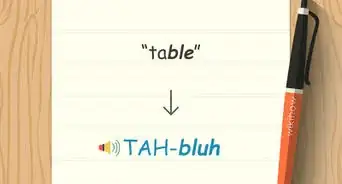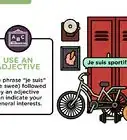X
This article was co-authored by Language Academia. Language Academia is a private, online language school founded by Kordilia Foxstone. Kordilia and her team specialize in teaching foreign languages and accent reduction. Language Academia offers courses in several languages, including English, Spanish, and Mandarin.
This article has been viewed 176,448 times.
Future Simple is used to describe things that will happen in the future.
Steps
Help Conjugating French Verbs
Method 1
Method 1 of 1:
Conjugating French Verbs into Future Tense
-
1The endings for regular verbs are: ai, as, a, ons, ez, ont.[1]
-
2Add the endings to the infinitive form of the er or ir verbs. Remove the 'e' before appending the suffix to an '-re' verb.[2]
- Example: PARLER: Je parlerai, tu parleras, il/elle/on parlera, nous parlerons, vous parlerez, ils/elles parleront
- With IR: FINIR: je finirai, tu finiras, il/elle/on finira, nous finirons, vous finirez, ils/elles finiront
- With RE: VENDRE: Je vendrai tu vendras, il/elle/on vendra, nous vendrons, vous vendrez, ils/elles vendront
Advertisement
Community Q&A
-
QuestionHow can I learn the passe compose tense in French?
 Community AnswerThe passe compose is a compound tense that can be formed by combining the following: subject + conjugated form of avoir + past participle of the verb. This works for all verbs but the following irregular verbs: Descendre, Retourner, Monter, Rester, Sortir, Passer, Venir, Aller, Naitre, Devenir, Entrer, Rentrer, Tomber, Revenir, Arriver, Mourir, and Partir. These verbs are all conjugated using the following (very similar) formula: subject + conjugated form of etre + past participle of the verb.
Community AnswerThe passe compose is a compound tense that can be formed by combining the following: subject + conjugated form of avoir + past participle of the verb. This works for all verbs but the following irregular verbs: Descendre, Retourner, Monter, Rester, Sortir, Passer, Venir, Aller, Naitre, Devenir, Entrer, Rentrer, Tomber, Revenir, Arriver, Mourir, and Partir. These verbs are all conjugated using the following (very similar) formula: subject + conjugated form of etre + past participle of the verb. -
QuestionHow do I form the future proche in French?
 Community AnswerThe future proche is a composite tense formed by combining the following: subject + conjugated form of aller + infinitive of a verb. For example, Je vais parler ("I will talk", or rather more directly translated as "I'm going to talk"), Ils vont partir ("They will leave"/"They are going to leave"), Elle va aller au restaurant ("She will go to the restaurant"/"She is going to go to the restaurant"). This formula for forming the future proche works for both regular and irregular verbs, making this one of the easier tenses to learn.
Community AnswerThe future proche is a composite tense formed by combining the following: subject + conjugated form of aller + infinitive of a verb. For example, Je vais parler ("I will talk", or rather more directly translated as "I'm going to talk"), Ils vont partir ("They will leave"/"They are going to leave"), Elle va aller au restaurant ("She will go to the restaurant"/"She is going to go to the restaurant"). This formula for forming the future proche works for both regular and irregular verbs, making this one of the easier tenses to learn. -
QuestionWhat do I do to change verbs into imparfait?
 Community AnswerBegin with the present nous form of the verb. Remove the -ons and add ais (for je and tu), ait (for il and elle), ions (for nous); iez (for vous) ; aient (for ils and elles). For example, the imparfait first-person of aller would become j'allais.
Community AnswerBegin with the present nous form of the verb. Remove the -ons and add ais (for je and tu), ait (for il and elle), ions (for nous); iez (for vous) ; aient (for ils and elles). For example, the imparfait first-person of aller would become j'allais.
Advertisement
References
About This Article
Advertisement
